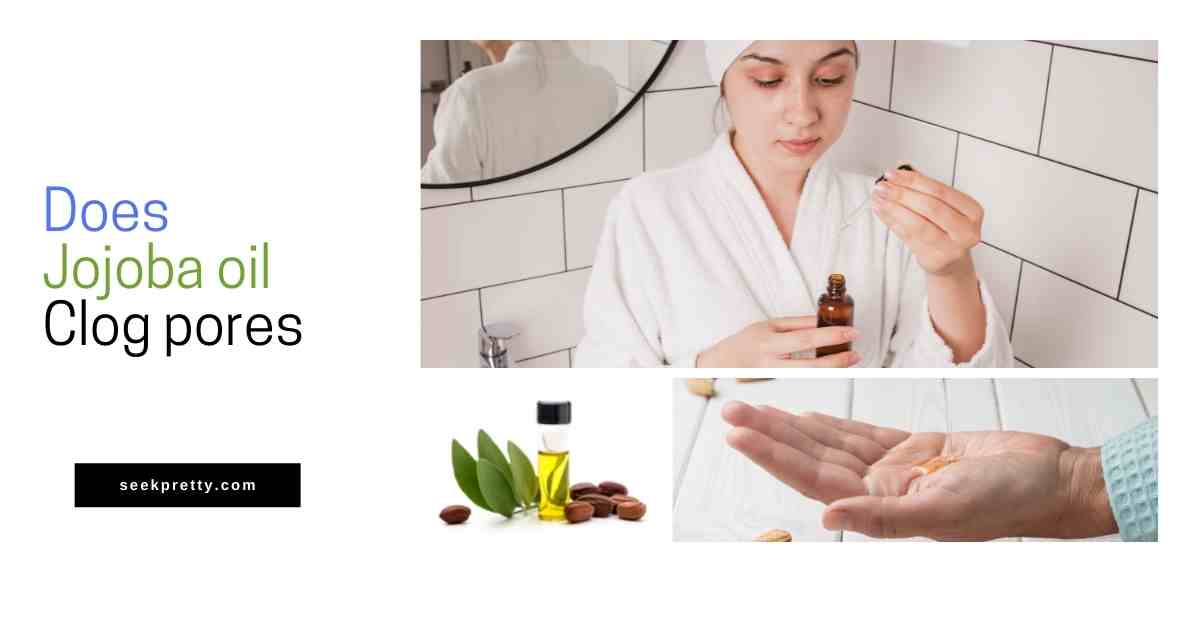Jojoba oil is made from the seed of the jojoba plant. The oil has a similar chemical composition to sebum, which is the oil that our skin produces naturally. Jojoba oil is non-comedogenic, meaning it won’t clog your pores. In fact, it can actually help to dissolve excess sebum and dirt that’s trapped in your pores. I personally love using jojoba oil but my favourite oil is almond oil because it contains lots of vitamin A and oleic acid which work best for me.
Jojoba oil is also anti-inflammatory, so it can help to reduce redness and swelling associated with acne. Some people find that jojoba oil helps to “purge” their skin by helping to speed up the turnover of skin cells. This can help to clear away dead skin cells and unclog pores, making them look smaller.

Contents
Jojoba oil purging
Purging of your skin sounds intense but its just a name for when your dead skin cells are removed more quickly so they can renew with newer skin cells. You’ll probably have experienced this when you use an intensive facial scrub. Your skin ends up looking rough and red and you may breakout and have dry skin for a little while. After the side effects of a skin purge clear, you’ve cleaned out and unclogged your pores and this will lead to healthier looking skin.
Using natural oil cleansing methods like jojoba oil for purging is a common practice. Oil cleansing is a popular method of cleaning the skin, especially the face. Jojoba oil is often used for this purpose because it is gentle and effective. There are many benefits to using jojoba oil for purging, including its ability to remove makeup, dirt, and excess oil from the skin
What is jojoba oil made from
Jojoba oil is a natural and sustainable alternative to many other synthetic oils. It’s made from the jojoba plant, which is native to North America. The main component of jojoba oil is Eicosenoic acid. Eicosenoic acid is a fatty acid that can be found naturally in your skin. It has been shown to have some benefits when used in skincare products, but there are also some disadvantages to using this ingredient.
One of the main benefits of eicosenoic acid is that it can help to improve the barrier function of the skin. This means that it can help to keep moisture in and irritants out, which can help to improve the overall health of the skin. However, eicosenoic acid can also be a very drying ingredient, so it is important to use products that contain this ingredient sparingly. If you do use products that contain eicosenoic acid, it is important to follow up with a moisturizer such as to help keep the skin hydrated. In fact I just wrote about Tatcha and drunk elephant and some of their moisturisers.
How likely is jojoba oil to help acne
Clogged pores can cause blackheads, acne and greasy skin. Most of us have experienced all three of these on our faces. The pores around our nose are the most difficult area to get rid of clogged pores, this is because the pores here are larger and more noticeable.
When used as part of an intensive skin cleansing program you might want to use jojoba oil during the cleansing stage because it can help unclog pores. It isn’t the most intensive oil either, but be aware that before you see any improvements in your acne you will most likely experiences redder skin and more breakouts before you see any less acne.
Benefits of jojoba oil
Jojoba oil is non-comedogenic, meaning it won’t clog your pores. It’s also hypoallergenic and gentle enough for sensitive skin types. Jojoba oil can help to regulate sebum production, making it a good choice for both oily and dry skin types.
The vitamin E and B-complex vitamins in jojoba oil can help to nourish and protect the skin. Jojoba oil is also a good source of minerals like chromium and copper, which are important for healthy skin. Jojoba oil is a versatile oil that can be used on your face, body, armpit hair and hair. You can use it as a facial moisturizer, body lotion, or hair conditioner. Jojoba oil is also a good choice for massages and as a carrier oil for essential oils such as skin envy.
How Jojoba oil compares to other oils
I’m going to compare Jojoba oil with some other popular oils you will find in skincare products. I recently wrote about Cocoa butter and Almond oil and compared to these two oils, jojoba oil is most like almond oil when comparing how likely they are to clog pores because they are both non comedogenic. Cocoa butter is a much thicker oil that is also very likely to clog your pores.
However, Cocoa butter and jojoba oil both contain oleic acid which is very calming and an anti-inflammatory for your skin whereas Almond oil contains eicosenoic acid, a different kind of fatty acid that is good for balancing the oils in your face and can leave your skin looking more dewy and plump.
Let’s take a look at how Jojoba oil compares with some other oils used in skincare products so you can see which oils are most likely to clog pores and which are least likely. The comedogenic rating is the best way of comparing how likely an oil is to clog your pores. A rating of 5 means the oil is likely to block pores whereas a low rating of 0-2 is usually classes as non comedogenic and much less likely to clog pores.
This can also depend on your skin type. If you have oily acne prone skin and often breakout and experience blackheads then even an oil rated non comedogenic could still cause some blockage, so you need to try out some different oils to find which works best for you. If you have sensitive skin it’s more difficult to find the right oil, some of the high comedogenic rated oils, like cocoa butter, are very moisturising and have many benefits for your skin.
Oil
Jojoba oil
Cocoa butter
Almond oil
Date seed oil
Palm oil
Safflower oil
Comedogenic rating
2
4
2
3
4
0
Final thoughts
Overall, jojoba oil is a good option if you have neutral, oily or acne-prone skin. It’s gentle, non-irritating, and effective at dissolving sebum and dirt. If you have oily skin, you may find that jojoba oil helps to balance out your skin’s natural oil production. And if you have dry or sensitive skin, jojoba oil can help to keep your skin hydrated and healthy. So whether you’re dealing with acne or just looking for a good all-around facial oil, jojoba oil is worth considering.
Jojoba oil is very low on the comedogenic rating scale, with a rating or 2 out of 5. This means it is less likely to clog your pores than oils like cocoa butter or coconut oils which are very pore clogging. Whether or not an oil is likely to block your pores isn’t the only factor to think about even when you have oily or breakout prone skin.
Some of the vitamins, retinoids and fatty acids in oils can help soothe your skin with anti-inflammatory properties and other benefits such as making your skin look smoother or plumping out wrinkles. If you are looking for products to help with your wrinkles check out this article I wrote about Strivectin.

